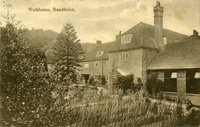 The Poor Law Amendment Act 1834 created a series of Poor Law Unions governed by Boards of Guardians. This system replaced the individual parish Overseers of the Poor which had been in existence since the 17th century. Each union administered workhouses and the distribution of poor relief within its parameters, which could cover several parishes. Boards of Guardians were elected and each civil parish was represented by a guardian or guardians (if the parish was particularly large or populous). There were various changes to administration but one of the biggest changes occurred in 1894 when the Local Government Act ensured that members of newly established rural district councils became guardians for their areas (although some elections still took place within more urban areas). At the same time, women were able to become guardians.
The Poor Law Amendment Act 1834 created a series of Poor Law Unions governed by Boards of Guardians. This system replaced the individual parish Overseers of the Poor which had been in existence since the 17th century. Each union administered workhouses and the distribution of poor relief within its parameters, which could cover several parishes. Boards of Guardians were elected and each civil parish was represented by a guardian or guardians (if the parish was particularly large or populous). There were various changes to administration but one of the biggest changes occurred in 1894 when the Local Government Act ensured that members of newly established rural district councils became guardians for their areas (although some elections still took place within more urban areas). At the same time, women were able to become guardians.
Boards of guardians were abolished in 1930 by the Local Government Act 1929, when their administrative functions were passed to local and national government authorities.
As with any government body, the administration of each poor law union produced a variety of written records. However, sadly they do not survive uniformly for each Union. Generally speaking, the most likely records to survive are the minute books. These recorded each meeting of the Board of Guardians, and reported not just contracts and suppliers but also individual cases that came before the Board. Whilst these did not include all those in the workhouse or who were applying for poor relief, they did report on matters concerning inmates where special attention was required. This might include records of children being sent to specialist schools, those sent to Lunatic Asylums, chasing the putative fathers of illegitimate children, and a range of other special cases. It is often possible to discover some fascinating insights into our ancestors lives, for example:
... the Hambledon Board of Guardians minute books (reference BG7/11/17-18) show the story of a Mrs Chewter [Chuter] who in June 1908 applied for assistance to pay for her and her children to join her husband in Canada. An entry a couple of weeks later tells us that her husband had agreed to pay part of the expense in sending his wife and children to join him in Canada. Applications were made to the Hon. Henry Cubitt for assistance (who declined) but by February the following year we find that George Chuter has scraped together the fares for his family but the Union are now seeking approval for funds to provide clothing for the children.
However, don't be surprised if your ancestor, who you know spent time in the workhouse, doesn't appear in the minutes; those cases which did come before the Board of Guardians were special cases for a variety of reasons and the general population of inmates are not necessarily mentioned.
To search the indexes to the Poor Law Union minute books of Hambledon (BG7/11/-), Farnham (BG4/11/-), Guildford (BG6/11/-), Dorking (BG2/11/-) and Chertsey (BG1/11/-), simply select the filenames below:
Minute books of other Surrey Poor Law Unions are being indexed by our volunteers and will go online soon.
Image
Hambledon Workhouse (reference PC/73/9/1)
Files available to download
-
Hambledon Poor Law Union minute books 1836 to 1910 (PDF)
Indexes to the Hambledon Poor Law Union minute books give names of individuals seeking poor relief in the workhouse, 1836 to 1910 -
Farnham Poor Law Union minute books 1872 to 1910 (PDF)
Indexes to the Farnham Poor Law Union minute books give names of individuals seeking poor relief in the workhouse, 1872 to 1910 -
Guildford Poor Law Union minute books 1836 to 1918 (PDF)
Indexes to the Guildford Poor Law Union minute books give names of individuals seeking poor relief in the workhouse, 1836 to 1918. Note this is a large file. -
Dorking Poor Law Union minute books 1836 to 1929 (PDF)
Indexes to the Dorking Poor Law Union minute books give names of individuals seeking poor relief in the workhouse, 1836 to 1929. Note this is a large file (3Mb). -
Chertsey Poor Law Union minute books 1835 to 1930, surnames A to D (PDF)
Indexes to the Chertsey Poor Law Union minute books give names of individuals seeking poor relief in the workhouse 1835 to 1930, surnames A to D -
Chertsey Poor Law Union minute books 1835 to 1930, surnames E to F (PDF)
Indexes to the Chertsey Poor Law Union minute books give names of individuals seeking poor relief in the workhouse 1835 to 1930, surnames E to F -
Chertsey Poor Law Union minute books 1835 to 1930, surnames K to R (PDF)
Indexes to the Chertsey Poor Law Union minute books give names of individuals seeking poor relief in the workhouse 1835 to 1930, surnames K to R -
Chertsey Poor Law Union minute books 1835 to 1930, surnames S to Y (PDF)
Indexes to the Chertsey Poor Law Union minute books give names of individuals seeking poor relief in the workhouse 1835 to 1930, surnames S to Y


